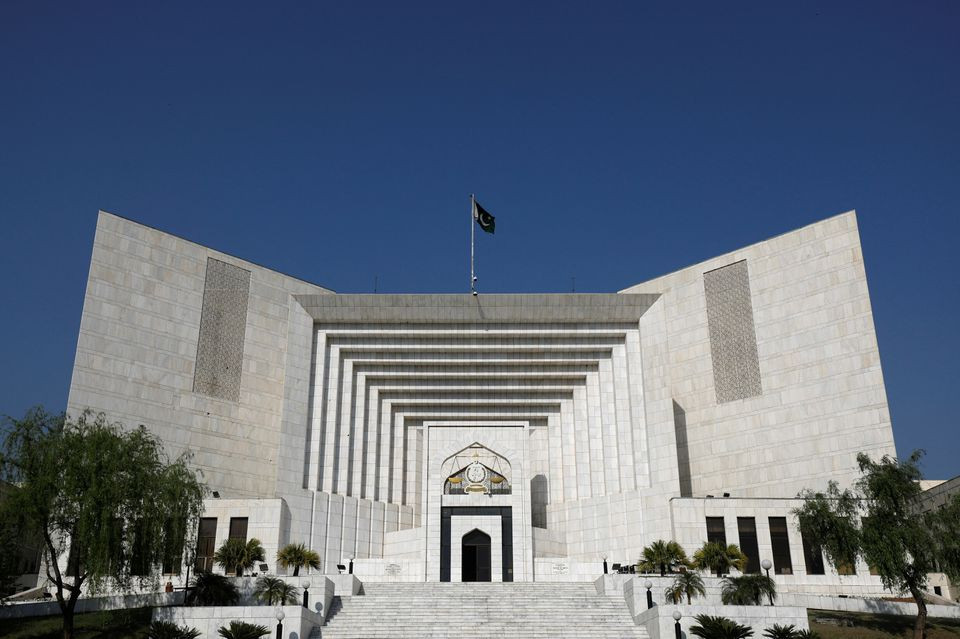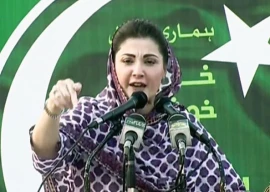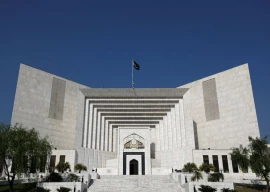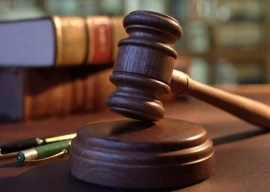
The Supreme Court ordered on Wednesday that President Arif Alvi should announce the date of the Punjab Assembly election, while the Khyber-Pakhtunkhwa (K-P) governor would set the election date of the provincial assembly in consultation with the Election Commission of Pakistan (ECP).
A five-judge larger bench of the apex court gave a 3-2 split verdict on a suo motu case about the election for the two provincial assemblies after holding hearing for two days -- Monday and Tuesday.
Chief Justice Umar Ata Bandial, Justice Munib Akhtar and Justice Muhammad Ali Mazhar supported the verdict, while Justice Jamal Khan Mandokhail and Justice Syed Mansoor Ali Shah dissented by opposing the admissibility of the suo moto case.
The court order stated that it was the constitutional duty of the federation, in terms of Clause (3) of Article 148 of the Constitution, to ensure that the government of every province was carried on in accordance with the provisions of the Constitution.
“There can be no doubt that this duty includes ensuring that a general election to the assembly of every province is held, and enabled to be held, in a timely manner within the period set out in the Constitution,” the ruling said.
“This duty is in addition to, and applies independently of, the duty cast under Article 220 on all executive authorities in the Federation and in the provinces to assist the Commissioner and the Election Commission in the discharge of his or their functions.”
On the date of the election, the ruling said that if the governor dissolved the assembly, then the governor would announce the election date. It ordered the K-P governor to announce the date for the polls after consulting the ECP.
Simultaneously, it added, the president and the ECP should announce polls in Punjab. The court also ruled that President Alvi’s orders would be binding on Punjab but not on K-P.
In ordinary circumstances, the judgment said, the general election to the Punjab Assembly ought to be held on April 9, 2023 -- the date announced by the president in his order of February 20, 2023.
“However, we are informed that on account of delay in the emergence of the date for the holding of the general election, it may not be possible to meet the 90-day deadline stipulated by the Constitution,” the court stated.
“If such a course is not available, then the Election Commission shall in like manner propose a date for the holding of the poll that deviates to the barest minimum from the aforesaid deadline,” it added.
The court said that the federal government was obligated “on an immediate and urgent basis” to provide the ECP with all facilities, personnel, and security required for the holding of the general elections.
It added that it was the duty of the provincial caretaker governments to proactively provide all aid and assistance required by the ECP. “The duty cast upon the authorities as set out in the 2017 Act must also be discharged forthwith and proactively,” it said.
The order stated that parliamentary democracy was one of the salient features of the Constitution. “There can be no parliamentary democracy without Parliament or the Provincial Assemblies,” the order continued.
“And there can be neither Parliament nor Provincial Assemblies without the holding of general elections as envisaged, required and mandated by and under the Constitution and in accordance therewith,” it said.
“Elections, and the periodic holding of elections, therefore, underpin the very fabric of the Constitution. They are a sine qua non for parliamentary democracy, and ensure that the sacred trust of sovereignty entrusted to the people of Pakistan is always in the hands of their chosen representatives.”
The order further stated that while the holding of general elections had different aspects and requirements, one that was absolutely crucial was the timeframe or period in which such elections were to be held.
It said that the Constitution envisaged two such periods, 60 days and 90 days. The first period, it continued, applied when the assembly dissolved on the expiration of its term and the second period was prescribed when it is dissolved sooner.
“We are here concerned with the dissolution of two Provincial Assemblies before the expiry of their terms and therefore to the holding of general elections in relation to each within 90 days,” read the order.
The verdict was split 3-2 with Justice Mansoor Ali Shah and Justice Jamal Khan Mandokhail dissenting with the majority. The dissenting note maintained that the suo motu was not maintainable.
The bench led by Chief Justice Bandial concluded the two-day-long proceedings in the suo motu case on Tuesday. Concluding the hearing, the bench reserved the verdict and said it would be announced before 11am Wednesday.
(WITH INPUT FROM APP)

1725354252-0/Untitled-design-(5)1725354252-0-405x300.webp)
1732099866-0/adele-(3)1732099866-0-165x106.webp)




1732099821-0/BeFunk_§_]__-(14)1732099821-0.jpg)














COMMENTS (3)
Comments are moderated and generally will be posted if they are on-topic and not abusive.
For more information, please see our Comments FAQ